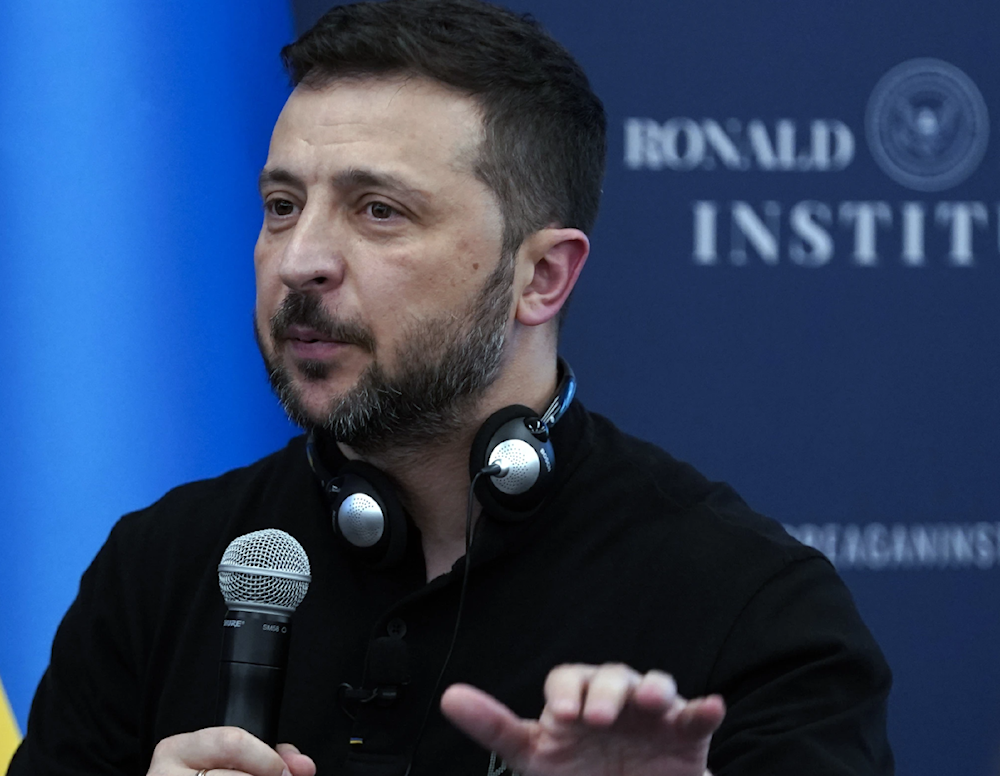Zelensky says most of world wants him to talk to Russia
Moscow has frequently stated that it is open to conversations with Kiev, but there are problems that must be resolved before any real discussion can begin, including Zelensky's legitimacy as a leader.
-

Ukrainian President Volodymyr Zelensky speaks at the Ronald Reagan Institute on the sideline of NATO summit in Washington on July 9, 2024 (AP)
According to Ukrainian President Volodymyr Zelensky, a majority of the international community wishes to see a diplomatic resolution to the war in Ukraine, which he told French media was only possible with Moscow's participation in negotiations.
Switzerland had its first peace conference in June which Zelensky said Russia was intentionally excluded from.
In his Wednesday interview, Zelensky expressed that Moscow should have a place at the table.
“The majority of the world today says that Russia must be represented at the second summit, otherwise we will not achieve meaningful results,”Zelensky stated, adding that "The first conference was snubbed by several countries, including China, which demanded talks that would allow both sides of the conflict to participate."
Moscow has frequently stated that it is open to conversations with Kiev, but there are problems that must be resolved before any real discussion can begin, including Zelensky's legitimacy as leader.
His tenure expired in May, and no elections were held owing to martial law.
According to Zelensky, by November, Kiev aims to present a plan based on the findings of the first meeting that would cover "territorial integrity, sovereignty, and so on."
When asked if Ukraine's restoration to its 1991 boundaries would be a necessary prerequisite for peace negotiations with Russia, Zelensky said that it is desirable but not imperative.
The preferable course of action for ending the war in Ukraine is the peace process, Kremlin spokesperson Dmitry Peskov stated last week.
At a meeting with participants of the New Media Festival, Peskov said, "Russia has never abandoned the peace process, and we remain ready. We have the task of ensuring our security both for us and for future generations. Of course, the peace process is preferable."
It is challenging to discuss the specifics of potential talks with Kiev without being aware of the specifics of the statement of Dmytro Kuleba, the foreign minister of Ukraine, said Peskov.
Kuleba stated earlier in the day when speaking with Chinese Foreign Minister Wang Yi in Beijing that Ukraine is prepared for discussions with Russia, but that they must be reasonable and realistic in order to bring about a fair and durable peace.
Back in April, Peskov himself had warned that in the near future, many across the world, including people in Ukraine, are likely to raise doubts about the legitimacy of Zelensky, insisting that he will have to "justify himself," while Foreign Ministry spokeswoman Maria Zakharova said Kiev's indications regarding its desire to begin peace negotiations with Moscow were not genuine.
Hungary's Orban says Trump has Russia-Ukraine peace plan if re-elected
After private negotiations with Republican candidate Donald Trump, Hungary's Viktor Orban declared that if he wins the US presidential election in November, he will quickly demand peace talks between Russia and Ukraine and that he has "well-founded plans" for achieving so.
According to Financial Times, the Hungarian prime minister wrote a confidential letter to EU leaders after consulting with Moscow and Beijing, suggesting that in order to find a peaceful end to the war in Ukraine, the EU should resume direct diplomatic relations with Russia and begin "high-level" talks with China.
In the letter, Orban added that the "general observation" based on his recent talks with presidents Volodymyr Zelensky of Ukraine, Xi Jinping of China, and Vladimir Putin of Russia was "that the intensity of the military conflict will radically escalate in the near future."
His visits with Trump, Xi, and Putin during the last month while serving as the rotating president of the European Union startled his partners in the alliance and the bloc.
Orban visited Russia last week on a peace mission that began with his earlier visit to Kiev and continued to China. Sources familiar with the matter told the newspaper that the EU's legal service informed member states on Wednesday that Orban's actions violated agreements that prohibit any measures "which could undermine the achievement of the Union's objectives."
At the same time, the Hungarian leader has reportedly violated an EU provision that mandates all members to conduct foreign policy "unreservedly in a spirit of loyalty and mutual solidarity."

 4 Min Read
4 Min Read








